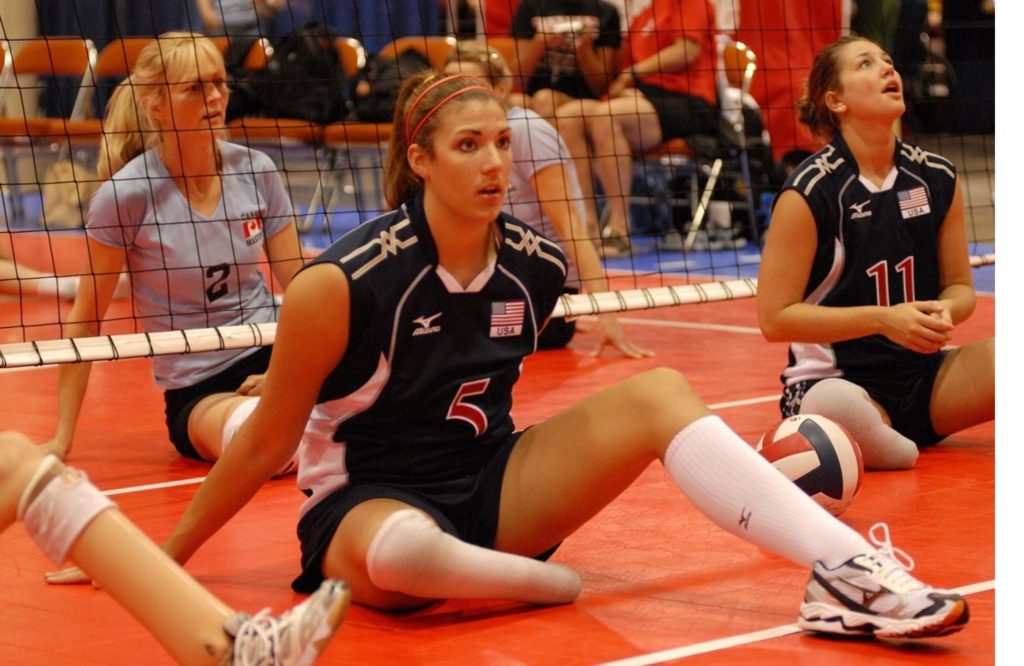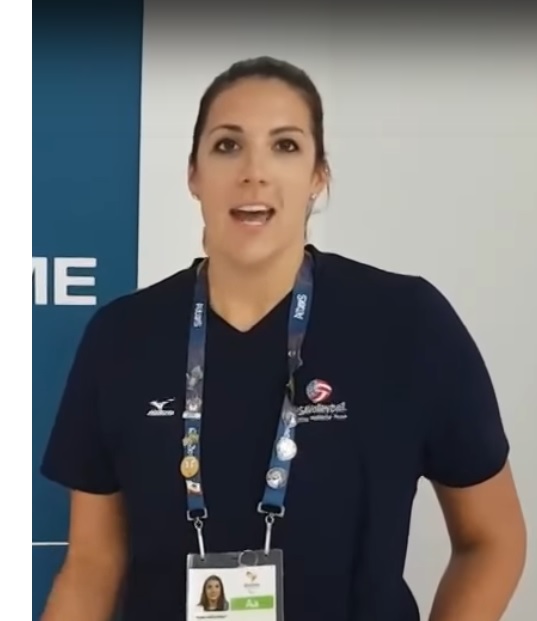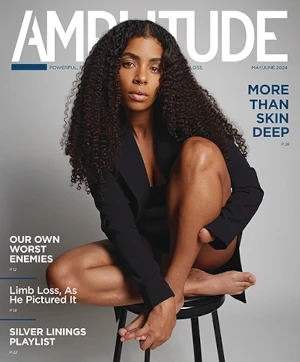Our interview with Katie Holloway continues. (Read the first half.)

And they were presenting this as if you should be grateful, because it was an equal increase across the board?
Correct. So in my position as an athlete representative, I knew the governance structure really well. The Paralympics suffers because of the governance structure and athlete representation. So I went directly to the three athlete representatives on the Board of Directors who had made the decision. And at the time they said the same thing: “We made it equal. Everybody got the same increase, 50 percent.”
And these were all Olympic athletes?
Correct.
Not a Paralympian to be found?
Nope. At the time of the decision, we had no Paralympic athletes on the Board of Directors. We had what they called the chief of Paralympics, who was in effect an able-bodied representative of what’s called the Paralympic Advisory Committee. But he wasn’t an athlete. I felt the three athletes on the Board were supposed to be my voice. And you better believe I was pretty adamant with them.
I wrote a pretty formidable email first to all three athletes on the Board. And I won’t say I was the only one. I probably was the strongest one protesting to them, but I’m sure there were other conversations being had. And I will give them the benefit of the doubt. I think they were very unclear as to how this decision seemed unequal to me. They were trying to get to the bottom of why I was upset, but they were in full agreement that it was an equitable decision and that they had made every consideration to be fair to all of the athletes.
In 2017 I became a vice-chair of the AAC. At one of our first meetings that year, Alan Ashley, who was the chief of sports performance for the USOC, presented this new performance funding plan the Board had approved. I just remember standing up and proclaiming my sense of feeling slapped in the face and not understanding how we were expected to accept this as fair. And that’s where the conversation turned to, “You generate less revenue. Paralympians generate less than 1 percent of the revenue.” And I spoke up again and I said, “How dare you define our value by the revenue we generate. If that were really the case, then by that logic you would give all the money to Michael Phelps, Simone Biles, and Katie Ledecky. You would give it all to the athletes who generated the highest revenues for you, and not to the Olympic athletes from minor sports.”
It doesn’t sound like you got very far in that meeting. Do you feel like you dented the armor somehow?
To be honest, I have never felt like I dented the armor. I know that’s probably not true, but at every step of the way that’s how it felt. Throughout 2017 we would continue bringing it up, and I don’t remember anything too significant happening in those meetings. We kept hearing over and over, “The pie is only so big, and it can’t grow. Would you like us to cut programs so you can all get your bonus money?” And I’m like, “No!” I can remember emailing this diatribe to [USOC CEO] Scott Blackmun and Alan Ashley. Because that’s what they were putting on us.

One thing that did happen, a former Paralympic athlete got named to the Board of Directors. Cheri Blauwet got named to the Board as an independent member. I think that was their move in an effort to say, “Okay, we hear you. We see you. We know we need a Paralympic voice on the Board.” But it was this very weird independent position. It wasn’t an athlete role. Cheri was very well known in the Paralympic community and spent a long time as a successful Paralympic athlete, but she was past competing. She had gone to medical school and become a doctor. She was still involved in the movement, and she was serving on the US Anti-Doping Agency board. So she’s very, very high level. It was their way of saying, I think, “We know we need a Paralympic voice, so here you go.” In my own opinion, it was just an effort to get a “safe” Paralympic voice.
A couple of other things happened in 2017. One is that we put together a working group to look at the bonuses. There were both Olympians and Paralympians involved. Obviously it was mostly Paralympians, but there were a lot of Olympians who were mindful that this was a very hot topic, and they were worried about it. So we sort of created this Operation Gold working group to figure out the numbers, break down all the decision making, and figure out what was actually happening so we could propose some alternatives. We did a lot of work. It was like pulling teeth to get numbers out of the staff of what our 2016 revenues were, and who got what bonuses. They gave us these spreadsheets but they’d scrubbed all the names, and so we had to decipher everything. We went through all of this on the working group, and we’d have these conference calls with really good conversations to think this through and propose a plan that doesn’t screw anyone, Olympian or Paralympian.
So then we started channeling our ideas through our athlete reps on the Board. They were having these quarterly calls, and we started putting pressure on Cheri [Blauwet] because the USOC had put her out there as this Paralympic athlete representative, even though she really wasn’t formally in that role.
While all this is occurring, simultaneously the Larry Nassar scandal started to blow up. So fast-forward to 2018, both Scott Blackmun and Alan Ashley are gone. [Blackmun resigned in February 2018, and Ashley was fired in December 2018.] I very much point to this as a turning point, because in my opinion—what I didn’t see before—is that they were just stringing us along but they weren’t really listening. When they left, it made a huge difference.
So it sounds as if, over time, you were making progress.
I don’t know, for me a lot of these actions seemed very—I still to this day don’t feel like they listened to anything I said.
Well clearly something changed along the way, because they did raise the bonuses.
I’ll never forget one conversation I had with Steve Mesler. He’s an interesting person. Steve is a bobsledder, and I think that publicly he is very Paralympic-friendly, but I think his ability to see the whole picture gets clouded sometimes. All along I felt like he was defending the Board’s decision [regarding the bonuses], and then I had this conversation with him—I can’t pinpoint when it was, but it was right when the Board had actually started to look at the numbers we were generating on the AAC working group. He called me and he was like, “Here’s the thing: It’s either equality, or it’s not.” The Board was discussing all these other options, like what it would take to get our bonuses to 50 percent [of Olympic bonuses], or what it would take to get us to the next step. They had all these options on the table, and he was like, “You know, I’ve decided we’re just not solving the problem if we don’t make them equal.”
And I was like, “OK, Steve, I agree.” I just remember having this funny moment of like, “You’re finally getting it,” and him being really mad that I was reacting like that. I said, “Well, of course I’m really glad this is where you’re at. I’m just letting you know this is what we’ve been asking for all along.”
So Steve had the revelation, and I think he became a champion for us finally. I think attitudes started shifting. From what I hear about the actual decision, the Board talked about the bonuses at consecutive board meetings. And one meeting before they made the decision, they talked to the financial person in charge—not the staff, but the person on the Board who was sort of the head of the financial committee. And he told them, “We have a rainy-day fund, and it’s enough. We can do this.” And so they made the decision to go equal. [The decision was made retroactive to reward medalists from the 2018 Winter Paralympics—but not 2016 Rio medalists.]
That’s fantastic. But explain something to me. After all this, why do you say that you still feel they didn’t listen to anything you said? I mean, maybe it took them a long time, but they finally heard you.
One of the lessons I’ve learned from this whole scenario is that it’s not my job as an athlete or an athlete representative to figure out the numbers. It is my job to tell you how athletes are feeling and what they want, and to share with you why it matters and what it ultimately means. I’m there to share the athlete voice and try to do it in a thoughtful and meaningful way. But I can’t make sense of the numbers if you’re not giving them to me. And I feel like that’s what they were doing for two years. I felt like they were saying that if we couldn’t figure out the numbers for them, there’s nothing they could do. And we looked really hard at the numbers and we gave them ideas, but that’s not what finally convinced them. That’s why I say I didn’t really have an impact. Maybe I’m wrong about that, but it’s what I truly believe even though I did have a voice in it.
It still didn’t feel like the organization itself had embraced the full equality of Paralympians. Throughout this whole process, I had been fighting for an active Paralympic athlete to be on the USOC Board of Directors in one of the three athlete roles. I wanted that written into the bylaws. Those were the two goals I laid out when I ran for vice-chair of the AAC: to get a Paralympic athlete on the Board, and to change the bonus equity.
We finally got the Board representation last year, when Brad Snyder got elected. Brad is a Paralympic gold medalist in swimming. He is also a former Naval officer who served in Afghanistan and Iraq. He’s visually impaired, completely blind.
So someone with experience, athletic achievements, and gravitas.
Huge. I call him the Golden Boy because, honestly, he’s a marketing gem. He’s so well spoken, he’s got all of it together. His main concern has always been about how the Paralympics suffered because of the governance structure and athlete representation of the USOC. The bonus inequality was directly related to the representation. Those two conversations always went hand in hand.
Brad and I first talked about this in 2014, but it really started earlier than that. The AAC, which is the channel where we’ve had the biggest voice, started out with zero Paralympians. I think it was Jessi Galli-Cloy who really advocated for more positions for Paralympians. So that’s where we’ve been growing the longest. We have steadily increased our representation, and that’s collectively changed the landscape of the AAC and collectively changed the athlete voice in a huge way.
Read more about Katie Holloway’s Paralympic career.



